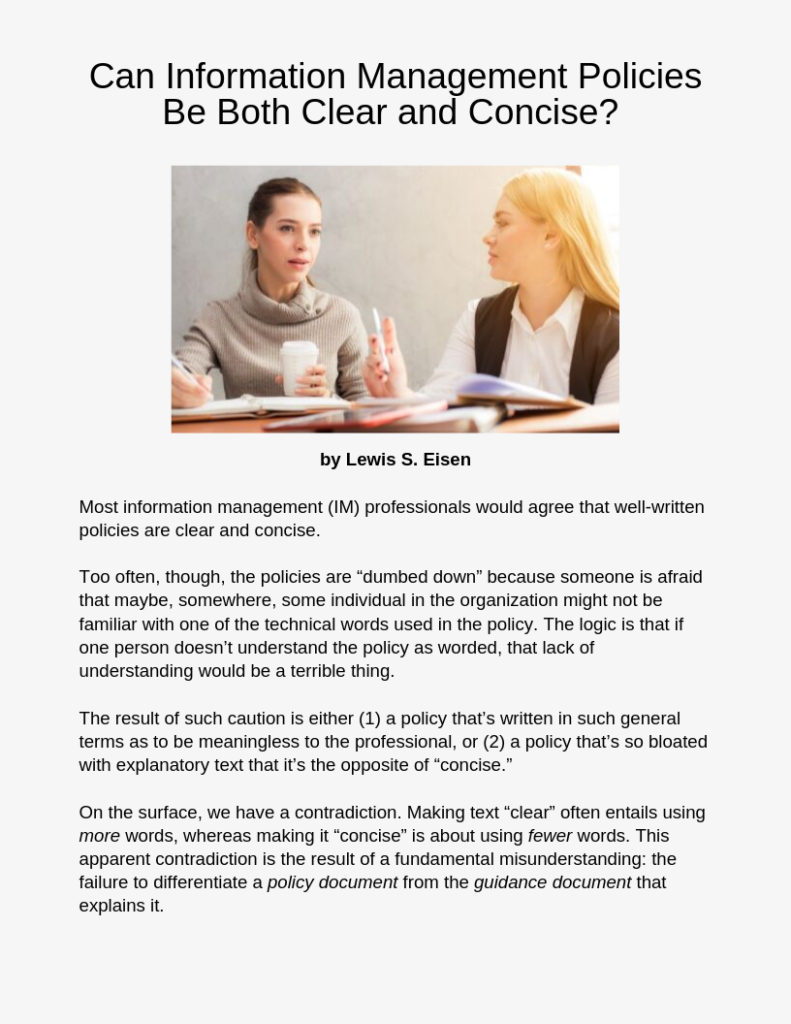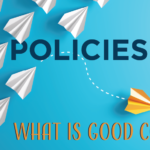Can Information Management Policies Be Both Clear and Concise?

Most information management (IM) professionals would agree that well-written policies are clear and concise.
Too often, though, the policies are “dumbed down” because someone is afraid that maybe, somewhere, some individual in the organization might not be familiar with one of the technical words used in the policy. The logic is that if one person doesn’t understand the policy as worded, that lack of understanding would be a terrible thing.
The result of such caution is either (1) a policy that’s written in such general terms as to be meaningless to the professional, or (2) a policy that’s so bloated with explanatory text that it’s the opposite of “concise.”
On the surface, we have a contradiction. Making text “clear” often entails using more words, whereas making it “concise” is about using fewer words. This apparent contradiction is the result of a fundamental misunderstanding: the failure to differentiate a policy document from the guidance document that explains it.
Let’s start with some examples outside the world of IM, to make the distinction easier to see.
Policy vs. Guidance Document: Income Tax
So far, you’ve likely managed to file your annual income tax return each year without having to read the Income Tax Act.
The Income Tax Act is the operative authority. It’s written in technical language, meant to be understood by experts in the tax field. There is no expectation that you and I ever read that document, despite the fact that it does apply to us.
To help us file our annual returns, a separate piece of guidance has been written, called something like How to Fill Out Your Income Tax Form. The guidance explains everything we need to know about the Act to get the job done, along with other helpful advice.
It is that guidance document that “dumbs down” the technical jargon of the Act and explains concepts that might be confusing. It is that guidance document that uses plain language, that gives us examples, and that fills in any gaps in our knowledge.
As a taxpayer, I do my job properly when I follow the instructions contained in the guidance document. Even when I need clarification, I don’t reach for the Income Tax Act to get it. Instead, I look for an expert who can help me understand the situation.
Policy vs. Guidance Document: Disease Control
A local hospital has a policy that reads as follows:
All incoming cases presenting sub-dermal or subcutaneous lesions
are treated as epidemiological risks.
I have no clue what that policy means. I’m not trained in medicine, and it uses words that I don’t understand.
But so what. If I’m supposed to take some action as a result of this policy, the hospital will post a sign somewhere in plain language telling me to wash my hands or wear little cloth booties or whatever it is I’m supposed to do.
Whether I understand the wording of a hospital policy is of no importance. What’s important is that the medical specialists in that institution can all agree on what the policy means.
If they do all agree, then they can explain it to the rest of us. If they don’t agree, then we have a problem that’s worth paying attention to.
Policy Documents Are for Experts
While everyone in your organization may be governed by the IM policies, few people actually need to read them.
All authorities — that is, statutes, regulations, policies, and standards — are not written to be used by the layperson. What is important is that the language in the authorities is clear and meaningful to experts in the field. Once that condition is fulfilled, the experts can give the non-experts some plain language guidance to tell them what to do.
In my experience, the more serious problem with IM policy documents has been that the IM professionals at the organization weren’t all on the same page about how various statements were to be interpreted. As a policy writer, if you can achieve a single, common understanding of a given wording among the experts, you have done your job. Making the policy understandable to the masses is a separate task, handled by the guidance you produce.
Confusion Also Stems from Misuse of ‘Policy’ in Titles
It’s no wonder that people confuse policy documents with the supporting guidance documents. Many web sites direct you to a page erroneously called “Privacy Policy.” When you get there, the document you find is not an actual policy, but rather guidance explaining the policy to you. The policy itself is a separate document, sitting somewhere in their corporate records repository.1
When the Actual Policy Document is Needed
A policy is more like a wall stud than wallpaper. It supports the wall, but it’s not what people should see when they walk in the room.
The guidance documents are the wallpaper. The policies provide a framework on which the wallpaper is hung. The vast majority of people never have to see the studs holding up the wall behind the wallpaper.
If your guidance is written properly, the only time you will need to produce the original policy document is when you’re challenged on it. It’s when someone storms into your office, shouting, “Show me! Show me the policy that says that I’m not allowed to chew bubble gum in the office!”
On those occasions, you will be prepared. You calmly reach into your back pocket and pull out the authoritative instrument. You point to the relevant statement and say, “Look, right here. It says ‘no synthetic masticating substances.’ ’’ And then you can add, “That means ‘bubble gum.’ ”
How to Get to ‘Clear and Concise’
When you accept that your IM policy documents are not written for a general audience, you have the freedom to use whatever technical terms are required for clarity. You can omit all the simplifications, explanations, teaching points, and examples, and instead focus directly on technical accuracy.
When you limit your policies to only what is necessary to express the policy decisions made, and put all the “in-case-someone-doesn’t-understand” information into your guidance, you will be able to produce policies that are both clear and concise.
1 To add semantic insult to lexical injury, a website might ask you to “consent” to the policy. Any law student can tell you that you can consent to “terms” of an agreement, but as an outsider to the organization you have no standing to consent or not to consent to the policy!

View the PDF version of this article.
[ls_content_block id=”682″]
[ls_content_block id=”629″]
[ls_content_block id=”746″]
About the Author

- Lewis S Eisen, JD CIP SIPC is the developer of the Perfect Policies™ approach to using respectful language in policy drafting, which has been adopted in organizations around the world. His international bestseller Rules: How to Write Rules that People Want to Follow, is now in its third edition and is also available in French. Lewis draws on 40 years’ experience as a practising lawyer, business consultant, and federal civil servant. Lewis was the winner of the ARMA International Britt Literary Award in 2020.




